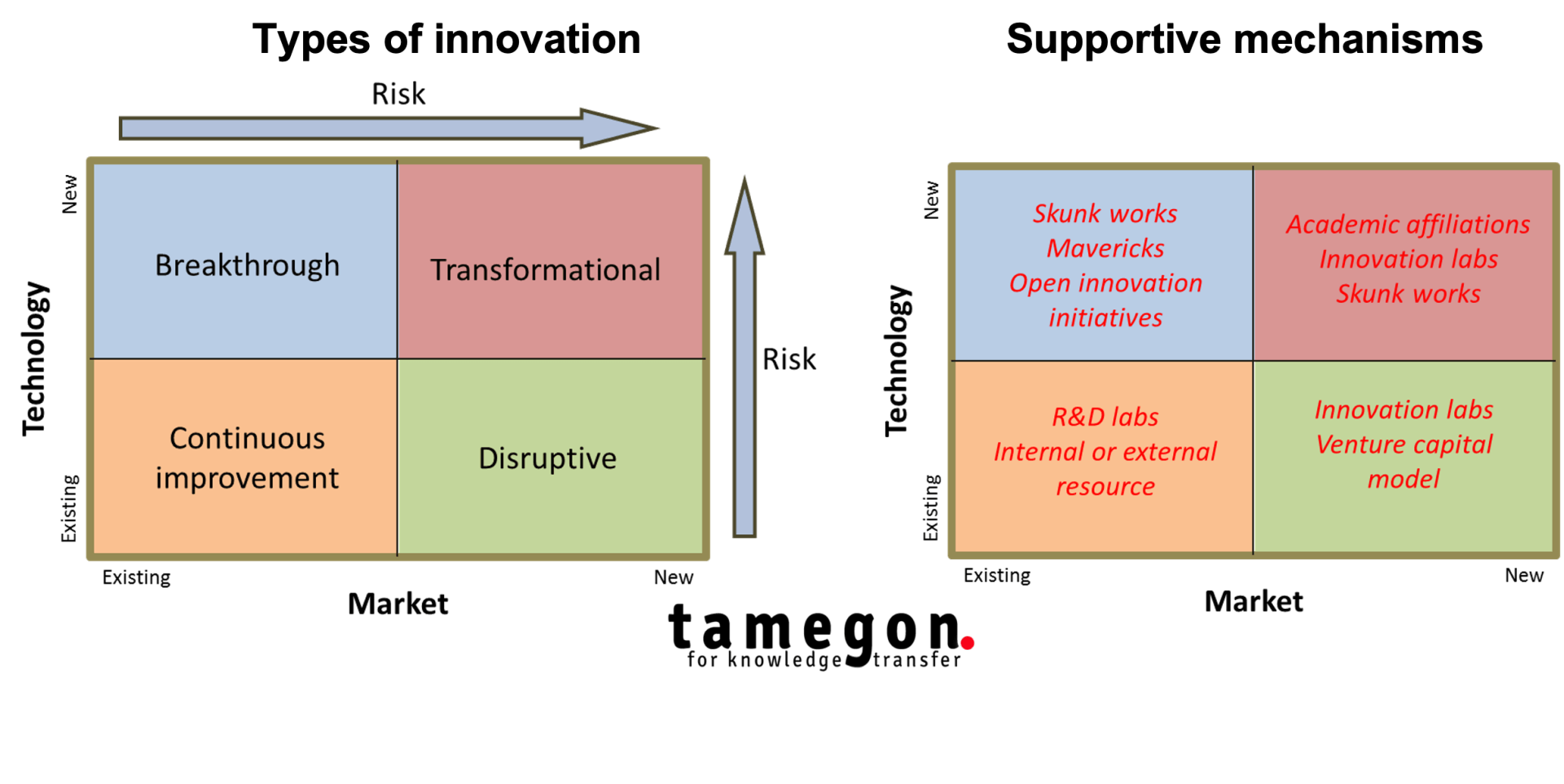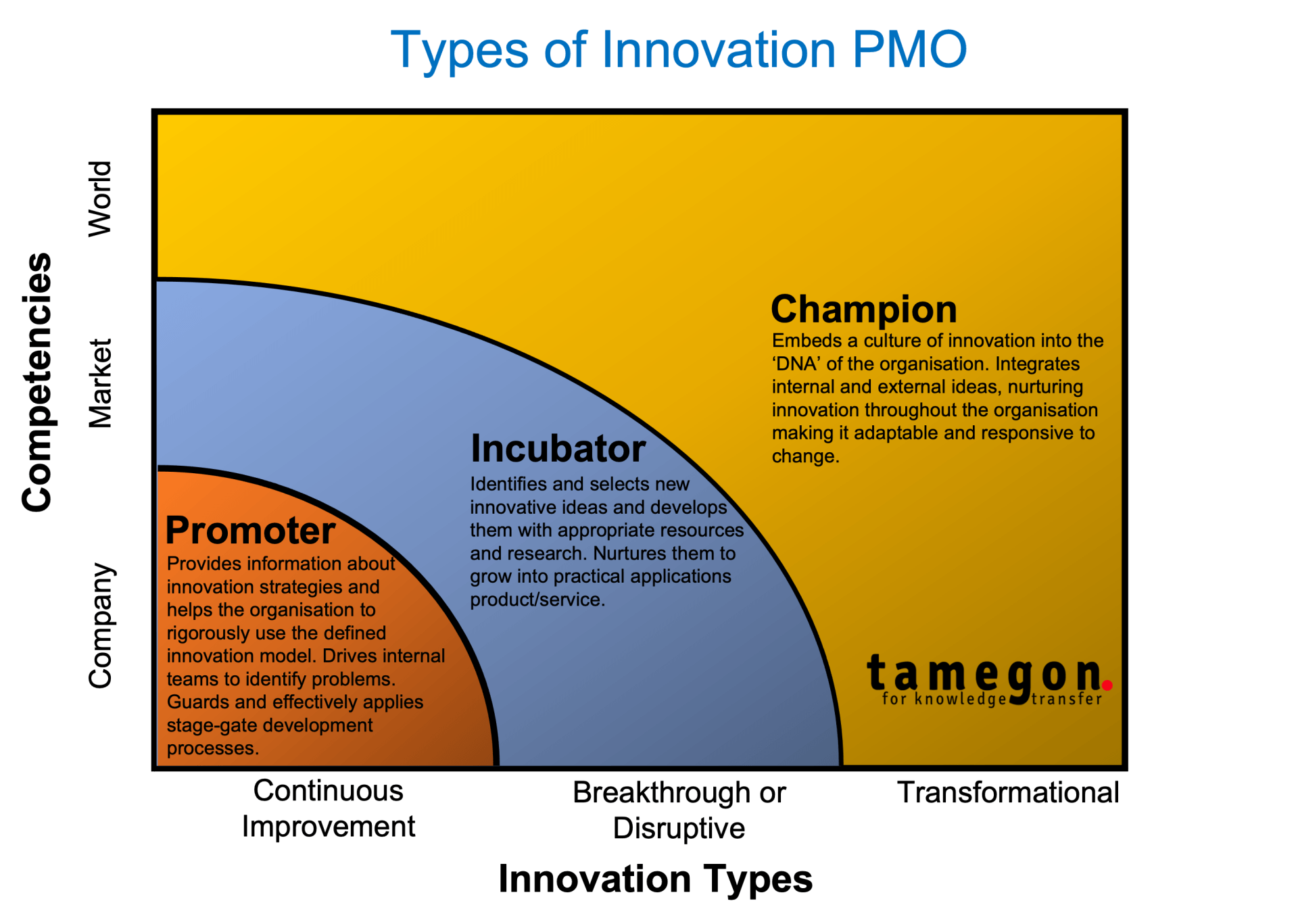What types of innovation PMO can organisations consider implementing?
Dr Costas Chryssou
February 27, 2022
tamegon Innovation and Growth Advisory Firm
Experience shows that innovation management presents many challenges to organisations of any size, across industries and sectors. There is also a lot of discussion about how an organisational structure such as an innovation PMO, could assist innovation pursuits - the main aim being to develop a balanced approach, supporting the innovation process without stifling the creativity that innovation relies upon.
If an innovation PMO is an organisational structure that can support such a complex endeavour, such as the innovation management process, how can organisations implement one?
A good starting point would be to understand the type(s) of innovation the organisation is interested in pursuing. Each type of innovation requires a different management approach and therefore, one might argue, a different type of innovation PMO to support it.
In one of my previous articles, I described four types of innovation in a 2 x 2 matrix encompassing continuous improvement, disruptive, breakthrough, and transformational innovation. Continuous improvement or incremental improvement is more about value optimisation incorporating value-adding product modifications. It usually involves using existing technology and improving a product targeting an existing market.
Increased competition in the marketplace though cannot be addressed only by continuous improvement. Breakthrough innovation allows organisations to leap forward ahead of competitors by coming up with new technological developments and/or business models.
Disruptive innovations
present specific challenges to all organisations because of the innovator's dilemma issue - incumbent companies having streamlined their operations and products to profitably serve specific market(s), find it difficult to back new technologies or business models which tend to, among other things, be unproven, sometimes under- performing in specific areas, and generally presenting a high risk business proposition.
Transformational innovations, on the other hand, can impact on the nature of society.

Organisations need to implement different supportive mechanisms to engage with and be successful at these four types of innovation encompassing, on one hand, R&D labs and predominantly the use of internal resource, and on the other hand, forming innovation labs and employing the venture-capital model to assess and develop promising projects and technologies that are aligned with the overall strategy. Each type of innovation demands a different organisational culture that supports, nurtures and develops innovation projects in a systematic way, working across organisational silos and bringing together talented people (internal or external) from a wide variety of fields and disciplines to work together and cross-fertilise.

Whatever the type(s) of innovation an organisation is pursuing a PMO structure could be pivotal to the success of its innovation endeavours. Below, I describe three types of innovation PMO that can support different types of innovation as well as the competencies that are required for the organisation to be successful at pursuing them:
- Promoter: Provides information about innovation strategies and helps the organisation to rigorously use the defined innovation methodologies; it drives and facilitates internal teams to identify problems and guards, and effectively applies stage-gate development processes. The promoter innovation PMO is more designed to support continuous improvement and 'new to the company' innovations.
- Incubator: Identifies and selects new innovative ideas and develops them with appropriate resources and research. Nurtures them to grow into practical applications for products or services leading to successful product or service launch; it predominantly deals with 'new to the market' innovations.
- Champion: Leads and embeds a culture of innovation into the ‘DNA’ of the organisation; integrates internal and external ideas (open innovation), nurturing innovation throughout the organisation making it adaptable and responsive to change. It equips the organisation with the skills to deal with and launch 'new to the world' innovations.
As organisations divide their innovation efforts among all types of innovation, creating a balanced innovation portfolio, the development of the 'right' type of innovation PMO to support these efforts is crucial to the success of the organisation.
In general, a PMO-type approach for innovation is likely to positively influence an organisation in different ways:
- ensuring alignment with overall strategy,
- achieving consistent results from innovation pursuits across longer time-scales,
- capturing accurate information and presenting a better opportunity to embed lessons learned,
- developing experience and knowledge to successfully launch many concurrent projects and complete them within the organisational constraints (budget, time, quality, scarce resource),
- offering enhanced ability to respond to changes in the competitive market environment.
I welcome your views and comments.

Costas Chryssou
MBA, PhD
Founder and Managing Director
Sign up for our
articles
Sign up to our newsletter











